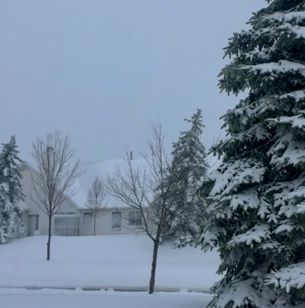Relationships
How Do You Build a Community That Cares?
Personal Perspective: We can care about each other, not about our differences.
Posted January 24, 2024 Reviewed by Lybi Ma

It’s cold outside. True winter. The kind where you can’t tell if it’s snowing again or the wind is just messing with the snow already on the ground, and you should head home.
I’m not nearly ready to go home. I’m standing shoulder-deep in water waiting for my favorite aquacise class to begin. I’m not alone on this cold morning. There are 30 other people in the pool. We’re talking to each other, commenting on the snow, new recipes we’ve tried, and what we did on the weekend. It’s the sort of conversation that is so easily shared with friends.
When Donna Boucher, one truly amazing, kick-butt trainer strides in to start the class, the morning chatter quiets. Before she begins, she updates us on one of our classmates who slipped on her basement stairs the night before and took a tumble. Unfortunately, Donna tells us, she won’t be coming to back class until the bruising and soreness subside.
Donna looks around the pool, checking to see who is there and who is missing, and asks if there are any concerns.
Then, she asks about the temperature of the water. We know enough not to say it’s cold because if we say it’s cold, she will crank up the workout to warm us up, and we will feel it all the way to Sunday. We all laugh when someone shouts out that it’s warm. It’s not.
In a world fractured by COVID, politics, and economic and cultural divides, I have unflinching respect and devotion to Donna because the workout she leads is one thing, but the sense of community she has created in class is another.
We are a diverse group. I have no idea who is a Democrat or a Republican, who goes to church or not, what people do or did for a living, where they went to college or even if they did, where they live, or whether they are vegetarians or love a good steak. Everyone in the water cares about the person standing next to them, and if, after class, I find out my car battery has died, I know I wouldn’t have to ask for help. Someone would volunteer to jump my car or stay with me until help came, and we’d laugh about it because it would be too cold to do otherwise.
I used to think that a sense of community formed when people shared values or goals. Or that a sense of belonging and comradery developed because they went to the same school, worked together, or their kids played on the same soccer team.
Certainly, those are the activities that help us find common ground and a sense of belonging. But perhaps that kind of community is not big or generous enough for the world we live in today.
Standing shoulder-deep in a barely lukewarm pool on a snowy winter morning has taught me that the kind of community we really need now is the one where we care about each other without having to be alike. Sometimes who we vote for, where we go to church, who we are married to, where we attended school, or what kind of house we own is not as important as caring about each other for no other reason than we happen to stand next to each other in deep water a couple times a week and might need each other someday.
Donna has built a community I care about and depend on—it's worth coming to class no matter how cold the water is because I not only want to be physically fit, I want to be part of a caring community.
I am not close friends with the woman who slipped and tumbled down her basement stairs, but I know who she is and am aware of how important Donna’s class is to her. Which is why I located her on Facebook and texted her to say I was thinking about her and hoped she healed quickly and would be able to come back soon.
She would have done the same for me.


